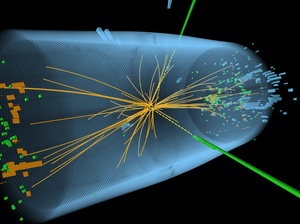Scientists have discovered a new subatomic particle with profound implications for understanding our universe. On Wednesday, they announced they've found a particle believed to be the long-awaited Higgs boson. Nicknamed the "God Particle," it represents the final piece in a theory that explains the basic nature of our universe.
Nothing has been easy in the search for the Higgs particle. It takes a huge amount of energy to create one, something on the scale of the energies that existed in the early moments of the Big Bang. Recreating that level of energy requires smashing particles together in the world's most powerful accelerators. Scientists knew that even if they created a Higgs boson, it would break apart immediately. The only way to identify it would be to sift through that subatomic debris, looking for signs of the decaying Higgs.
It's a key to the structure of the universe.
But experiments over the past year at CERN's particle accelerator in Switzerland, the Large Hadron Collider, seem to have surmounted all those hurdles. Early Wednesday, Joe Incandela, spokesperson for CERN's Compact Muon Spectrometer (CMS) team stood before a packed auditorium in Switzerland to report the big news ? in a way that only geeky physicists could really appreciate.
"In the region of 125 GEV, they combine and give us a combined significance of 5 standard deviations," he said, proving that even momentous discoveries sound dry if you get down far enough into the weeds.
Fabiola Gianotti spoke on behalf of a second huge collaborative experiment, the ATLAS group, that also reported results. The audience didn't even wait for her to speak after she flashed a slide showing that team's statistics.
"I'm not done yet," she told the group. "There's more to come, be patient!"
 Enlarge CERN/AFP/Getty Images
Enlarge CERN/AFP/Getty Images This graphic depicts a proton-proton collision from the search for the Higgs boson particle.
CERN/AFP/Getty ImagesThis graphic depicts a proton-proton collision from the search for the Higgs boson particle.
Through nearly two hours of technical details, the crowd of scientists got what it had come for. In the end, Rolf Heuer, director of the CERN particle accelerator, finally put it in plain language.
"As a layman, I would now say, 'I think we have it,' " he announced. But in almost the same breath, Heuer put his scientist hat back on and started shading his language: "We have observed a new particle consistent with a Higgs boson."
The scientists weren't ready to come right out and say this is the Higgs boson. It's a new particle, to be sure, and one that at first glance looks like the Higgs boson. But is this actually the Higgs boson everyone was expecting or something a bit different?
"That remains open," Heuer said.
He said it could take three or four more years to run the experiments necessary to figure out exactly what they've found. But Higgs or no, the discovery of a new particle is a major deal.
 Enlarge Fabrice Coffrini/AFP/Getty Images
Enlarge Fabrice Coffrini/AFP/Getty Images British physicist Peter Higgs (right), who proposed the Higgs boson in the 1960s, speaks with Belgium physicist Francois Englert at Wednesday's event.
Fabrice Coffrini/AFP/Getty ImagesBritish physicist Peter Higgs (right), who proposed the Higgs boson in the 1960s, speaks with Belgium physicist Francois Englert at Wednesday's event.
"This boson is a very profound thing that we found," said Incandela of the CMS team, putting it in layman's terms after his formal presentation. "This is not like other ordinary particles. We're reaching into the fabric of the universe at a level we've never done before. It's a key to the structure of the universe."
If it is indeed the Higgs boson, the discovery would provide evidence that there's a field ? the Higgs field ? that permeates our universe and interacts with particles to create mass. It explains why the atoms that make us who we are actually have substance.
"It's a rather profound thing," Incandela said. "That we can maybe answer the question someday: Where does our substance come from ? where does mass come from?"
Those deep ideas will be teased out in experiments to be run in the years to come. But Wednesday was a celebration for the entire field of physics. Even Peter Higgs, who proposed the Higgs particle back in the 1960s, was on hand.
"Congratulations to everybody involved in this tremendous achievement," he said. "For me, it's really an incredible thing that it's happened in my lifetime."
Higgs will now wait, along with everyone else, to see whether this new particle really is the one that bears his name.
lottery winners april fools day pranks ohio state vs kansas daniel von bargen the beach blood diamond 8 bit google maps
No comments:
Post a Comment